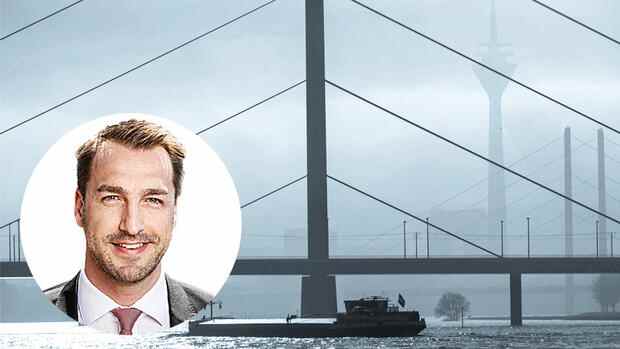Steffen Bauer is CEO of HGK Shipping GmbH.
(Photo: Imago, private)
“The path to the future can only succeed with a modern infrastructure” was the title of the guest article by Federal Transport Minister Volker Wissing in the Handelsblatt. As a logistics company, you want to agree immediately.
It is only regrettable that the article is exclusively a plea for rail and road. The government even recently reduced the budget for the maintenance and expansion of the waterways for 2023.
Inland shipping is essential for securing Germany as a business location. The supply of important sectors such as steel and chemicals with raw materials and energy is unthinkable without inland waterway vessels.
We only saw in July and August of this year what happens when the waterway system is not fully operational. Due to the extremely low water levels, operations in some areas of the Rhine and other rivers were severely restricted or even interrupted.
Top jobs of the day
Find the best jobs now and
be notified by email.
This had devastating consequences for the economy. Raw materials, grain, coal and other goods could not be delivered or transported to the planned extent.
The modern infrastructure demanded by Minister Wissing and the need to accelerate German planning law apply at least as much to waterways. For example, the deepening of the fairway on the Middle Rhine has been discussed for years.
Ships could then transport more cargo even at low water levels, which would make things much easier in low-water phases. However, the implementation of corresponding measures is not progressing.
>> Read here: Companies throttle production – also because of low water in the Rhine
In addition, the waterway system is also crucial for infrastructure measures in other modes of transport. How should the rail infrastructure be modernized and expanded if traffic cannot be shifted from rail to other modes of transport in the meantime? Should the traffic be on the road, where it would lead to additional traffic jams and infrastructure damage, or on inland waterways?
Of course, it is easier to carry out the structural change with a partner like rail than in a fragmented market like inland waterway transport. However, not attempting this at all or only half-heartedly misjudges the role of inland shipping – also for the path to climate neutrality.
Germany has just eight years to achieve the first sub-goal – and only 20 years later the vision of complete decarbonization should become reality. This can only be achieved with a consistent and, above all, rapid change in traffic in favor of rail and waterways: both are already the most environmentally friendly modes of transport in European goods transport.
A barge emits significantly fewer greenhouse gases than trucks that transport the same amount
A mobility concept includes the interaction of all modes of transport. Inland waterway transport already scores with low emission values per tonne-kilometer: an inland waterway ship causes just a quarter of the greenhouse gas emissions that occur when transporting the same amount of goods by truck.
In addition, an inland waterway vessel fetches large quantities of goods from the road, around 150 to 180 truckloads on average. With the equipment and conversion of the inland waterway fleet to low-emission drives and alternative fuels, transport on the waterway system will be climate-neutral in the medium term.
Projects and tests for semi-autonomous, i.e. remote-controlled and crew-reduced, inland waterway transport support the future of goods transport despite the shortage of skilled workers. Unlike rail or truck, the waterway has a lot of additional capacity for additional volumes of goods. In addition, goods are transported there largely without passenger traffic.
In order to secure the future of Germany as a business location, future-oriented upgrading of the waterway infrastructure and further digitization are necessary. An efficient and digital port infrastructure enables inland waterway transport to be seamlessly linked by rail or truck.
Germany can only achieve the goal of decarbonization by 2050 with a modern and efficient waterway system.
The author:
Steffen Bauer is CEO of HGK Shipping GmbH.
More: Low water in the rivers – why help for the logistics industry will be a long time coming
